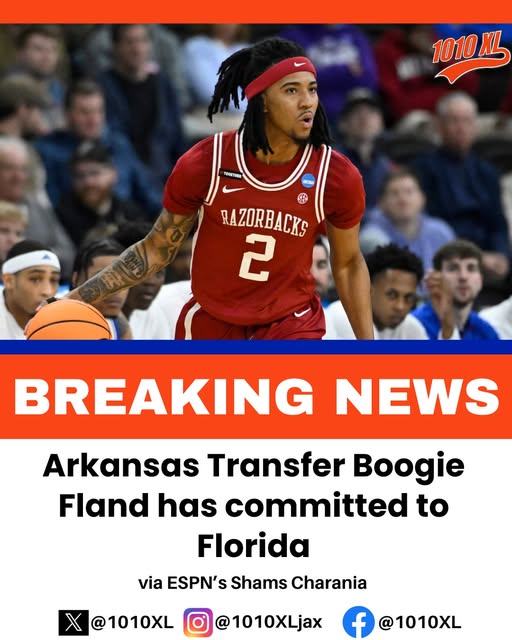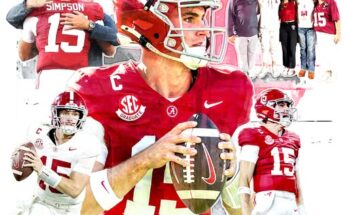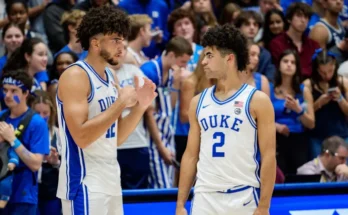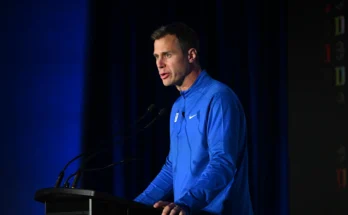Boogie Fland’s Transfer from Arkansas to Florida: What This Means for His Career and Both College Basketball Programs
The college basketball landscape is constantly evolving, with players making strategic moves to advance their careers, seek better opportunities, or find a system that fits their playing style. One of the latest high-profile moves involves Boogie Fland, the former Arkansas guard, who will be transferring to the University of Florida for his sophomore season, according to a report from ESPN’s Shams Charania. This transfer is significant for several reasons — it impacts not only Fland’s personal development as a player but also the dynamics of both the Arkansas Razorbacks and Florida Gators basketball programs. Understanding the context behind this move, the potential implications for the player and both teams, and what fans can expect in the coming season requires a deep dive into Fland’s background, the programs involved, and college basketball’s transfer culture today.
Boogie Fland emerged as a promising talent during his freshman year at Arkansas, showcasing skills that caught the attention of fans and scouts alike. Known for his quickness, ball-handling, and ability to create scoring opportunities, Fland had moments that highlighted his potential to be a significant contributor at the collegiate level. However, as with many freshmen, adjusting to the pace, physicality, and complexity of college basketball can be challenging. Arkansas, under coach Eric Musselman, has been building a competitive program focused on a fast-paced offense and strong defense, aiming to make deep runs in the NCAA Tournament. For Fland, the decision to transfer suggests that he may be seeking an environment better suited to his style of play or where he might have a clearer path to a larger role on the team.
The decision to leave Arkansas also reflects the broader trend in college basketball toward greater player mobility. Since the NCAA’s introduction of the transfer portal and the allowance for players to transfer once without sitting out a season, many athletes have taken advantage of the opportunity to find better fits elsewhere. This has led to increased player movement across the country and has changed the strategic calculus for coaches and programs. Where once a player might have been committed to a school for multiple years, now there is more fluidity, which can be both a challenge and an opportunity for teams.
Florida, coached by Todd Golden, is a program in transition, eager to re-establish itself as a powerhouse in the Southeastern Conference (SEC) and nationally. Adding a player like Boogie Fland signals a commitment to bringing in talent that can make an immediate impact. The Gators have struggled at times to find consistent offensive weapons, and Fland’s guard skills — especially his ability to penetrate defenses and create plays — could fill an important gap in their lineup. Additionally, Florida’s style under Golden has emphasized versatility and modern basketball principles like spacing and pace, which might align well with Fland’s skill set.
From Boogie Fland’s perspective, transferring to Florida could offer several advantages. First, it may provide him with more playing time or a starting role, depending on how the coaching staff integrates him into their system. Increased minutes on the court can lead to improved development and greater exposure, which is crucial for players with professional aspirations. Second, Florida’s platform, with its large fan base and competitive schedule in the SEC, offers opportunities to showcase his talents against top-tier competition. This exposure can enhance his profile ahead of potential NBA drafts or professional opportunities overseas. Third, the coaching philosophy and training resources available at Florida might better align with his developmental needs, helping him refine his skills and become a more well-rounded player.
On the flip side, Arkansas will feel the impact of losing a promising guard like Fland. While the Razorbacks have depth and a talented roster, every player who departs creates gaps that must be addressed either through recruiting or developing existing players. Musselman is known for his ability to adapt and get the best out of his teams, but losing a player mid-career always presents challenges. Arkansas fans will be watching to see how the program responds and which new or returning players step up to fill the void.
This transfer also highlights how the transfer portal is reshaping college basketball recruiting and roster building. Coaches must now not only scout high school prospects but also monitor the transfer market closely to find players who can immediately contribute. For players, the transfer portal offers a level of agency and flexibility that was harder to come by in previous decades. However, it also means players must weigh the risks and rewards carefully — moving to a new program involves adapting to a new system, teammates, and community, and there is no guarantee of success or playing time.
For fans, Boogie Fland’s move will be exciting to follow. Florida supporters will be eager to see how he fits into the Gators’ rotation and whether he can help elevate the team’s performance in the SEC. Arkansas fans may feel a mix of disappointment and hope, wishing Fland the best but also anticipating how their team will adjust. The narrative of a young player seeking new opportunities and growth resonates broadly in sports and beyond, reflecting the universal desire to find the right environment to succeed.
Looking ahead to the upcoming season, several key questions arise: How quickly will Fland adapt to Florida’s system and teammates? What role will he play on the Gators’ roster — as a primary ball-handler, scorer, or complementary guard? How will Florida’s style of play change with his addition, and how will that impact their overall team chemistry and success? On Arkansas’ side, which players will emerge to fill the gap left by Fland’s departure, and how will Musselman adjust his game plan to account for the change?
Ultimately, Boogie Fland’s transfer to Florida is more than just a change of jersey; it’s a pivotal moment in his career and a notable event within college basketball’s evolving landscape. It illustrates how players today have more freedom and control over their paths, and how programs must be nimble and strategic in managing their rosters. For Fland, this move could be the catalyst for his breakout season, where he can fully display the talent that made him a standout guard at Arkansas.
As the new season approaches, all eyes will be on Florida to see how effectively they integrate Boogie Fland and whether this transfer propels the Gators toward greater success. Meanwhile, Arkansas will continue to build on their strengths, showing resilience and depth in the face of roster changes. The transfer story of Boogie Fland is a microcosm of the modern college basketball era — dynamic, unpredictable, and full of opportunity. Fans of both programs and basketball enthusiasts in general will be watching closely to see how this chapter unfolds.



